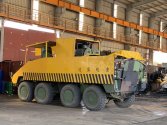Mr T
Senior Member
I didn't say it was. I meant, even if an F-35 sale was approved during Biden's presidency, there are plenty of customers ahead in the queue. How long would it take to deliver F-35s for Taiwan in meanginful numbers?I don't think any invasion would be predicated on a F-35 sale.
The 2049 deadline for Chinese "rejuvination" implies there's a cut-off point for an attack beforehand, in which case a bombed-out Taiwan full of angry and hostile locals is unlikely to generate good propaganda for Chinese TV. That would mean an invasion having to be successful at least a decade beforehand to properly pacify the area and break the will of the Taiwanese.
As an example I can imagine the KMT losing both the 2024 and 2028 elections being a trigger, as it would probably show that peaceful unification would be improbable before 2049.
He's 67. At some point he's going to get too senile to be trusted. Do you think even the yes-men in the CCP are going to welcome an 87 year old Xi, who's barely able to stand and frequently forgets important information, talking about another 10 years in charge? I don't know, perhaps the CCP has been so purged of people with backbone that they'd just smile and nod whilst internally feeling sick, but certainly until Xi took over that wouldn't have been stood for.I don't think that the idea is to fight a war over Taiwan, just to be able to win one. PRC was willing to wait 70 years for HK, they are willing to wait for TW. Without a term limit, Xi Jinping can afford to wait.
I strongly doubt that Xi is going to wait until a time where he could physically be too frail to avoid being booted out. He knows the weaker someone is the more ruthless internal Party politics becomes.
I can remember Chinese nationalists saying the same thing in 2010, so I wouldn't make any assumptions about what the situation will be by 2030.The time limitation is really more on America's watch, not PRC's. In another 10 years...
Well a US ambassador did visit Taiwan recently by accompanying the President of Palau. I guess we can play a game of ranking US officials and saying that the US ambassador to the UN is above China's red line but this ambassador was not.Actually some Taiwan commentators that everything is ready now for invasion. The Chinese leadership is just waiting for the Taiwan government to make a mistake. One recent example was the cancelled Kelly Craft visit to Taiwan last January 2021. That was a close call since the PLA is threatening to use of force if the visit was pushed.
Would the US ambassador to Norway be above or below the red line? Or the US ambassador to Japan?
China frequently draws its red lines with invisible ink. It hints that doing X will lead to a "severe" reaction, but it reserves the right to not take significant action if its bluff is called. Like when it threatened to retaliate against the Czech Republic due to the planned visit of the Senate leadership to Taiwan, and instead some piano orders were cancelled. Big whoop.
Last edited:


